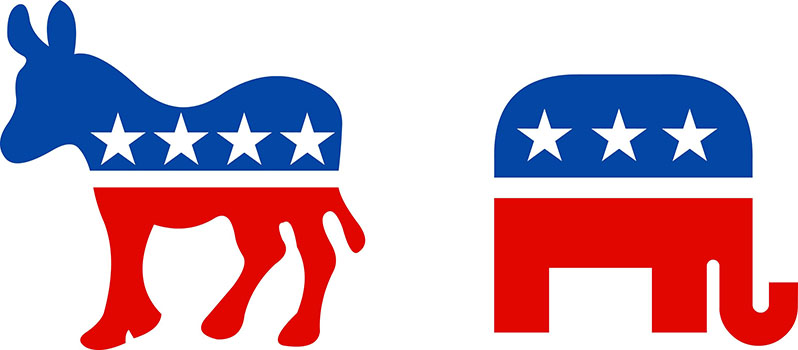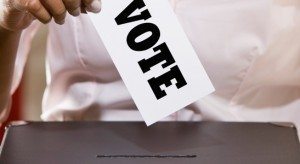The popular saying “never talk about politics or religion” exists as a rule of etiquette because of the potential conflict those topics can create, says Shawn Oller, office managing shareholder for Littler in Phoenix.
“Even in the best circumstances, political discussions bring forth very strong personal opinions from all sides,” Oller says.
Political discussions in the workplace, however, are even more problematic as these discussions can escalate into heated arguments among employees or cause employees to feel isolated or bullied. A once harmonious workplace can quickly devolve into lost productivity, lower employee morale and strained working relationships. With the country more polarized on a variety of issues, many employers are trying to minimize such discussions.
But the freedom to discuss and debate politics is what makes America great, right? Not in the workplace, experts say.
“A heated debate about a candidate’s stance on immigration may be construed as evidence of national origin discrimination,” says Marian Zapata-Rossa, partner at Quarles & Brady LLP. “Discussions about police brutality could develop into a racially charged hostile work environment. Even seemingly innocent discussions about political issues can rapidly turn into heated arguments that interrupt an employer’s operations.”
The political and social landscape of 2016 — fostered by political newcomer Donald Trump’s unabashed blustering — has created more workplace interruptions than most other election years. About 25 percent of human resources professionals say tension, hostility and arguments about politics among employees is more prevalent than during previous elections, according to a recent survey by the Society for Human Resource Management.
Beyond political posturing and bickering, political talk in the workplace can become problematic from a legal standpoint, experts warn.
“Even at its most benign, it can make employees uncomfortable,” says Kent Brockelman, managing partner at Coppersmith Brockelman. “It can be divisive and lead to morale problems. In more extreme versions, it can lead to, or even support, legal claims from employees against employers.”
While employers can’t ban political discussions, hostility and workplace chaos is not conducive to productivity or profitability. In an effort to maintain a calm workplace, what can employers do to calm the potential political storm?
“As a general rule, private sector employers may impose broad restrictions related to political discussions in the workplace,” says Stephanie Fierro, a partner at The Frutkin Law Firm. “Employers can restrict political discussions during work hours or restrict the disbursement or display of political material, when such restrictions are uniformly applied. But, employers must be mindful of the National Labor Relations Act (NLRA).”
What can you do?
In Arizona, as in most states, employers have significant leeway to implement policies governing employee conduct.
“Arizona law would not prevent an employer from implementing a rule prohibiting ‘excessive’ or ‘disruptive’ political talk in the workplace, or even prohibiting any political discussions at all,” says Don Johnsen, shareholder at Gallagher and Kennedy.
A private employer generally is free to regulate political speech in the workplace unless the employer operates in a state or city that specifically protects employees against discrimination because of political expression, or the employer is a party to a collective bargaining agreement that includes the same protection, according to John Balitis, director at Fennemore Craig.
“There is no federal law that specifically protects employees from discrimination or retaliation because of their political activities, affiliations or expressions,” Balitis says. “And the First Amendment largely is inapplicable in the private sector as it only protects a person’s right to free speech from government interference, not from interference by anyone else.”
Here are some other things Joseph T. Clees, shareholder at Ogletree Deakins, says an employer CAN do to limit political disharmony in the workplace:
- An employer can clearly communicate general expectations and foster a culture of mutual respect and understanding.
- An employer can establish a policy reaffirming that work time is for work and, consequently, political speech at work is only permissible at a designated time and place (lunch breaks, rest breaks, etc.). This minimizes disruptions, reduces distractions and encourages productivity.
- An employer can establish or reinforce a general policy limiting use of the employer’s equipment and communication systems to work purposes.
- An employer can establish or reinforce a general policy prohibiting the solicitation or distribution of political materials during working time.
- An employer can remind employees that its policies regarding unlawful harassment, discrimination, and retaliation apply to political speech.
What can’t you do?
One the flip side, here is what Clees says an employer CANNOT do:
- An employer cannot establish rules or policies that limit employee speech about workplace conditions because employees have the right to discuss their working conditions under the federal National Labor Relations Act (“NLRA”).
- An employer should tread carefully when banning political buttons and other such items unless it has a legitimate basis for such a restriction. Overly broad dress codes risk violating employee rights under the NLRA.
- An employer should avoid a total ban on political speech in the workplace. Not only is a blanket prohibition unrealistic and likely to be seen as overly harsh, but it may also be found unlawful under the NLRA because it could be interpreted as restricting employee speech regarding working conditions and/or terms or conditions of employment.“An employer cannot impose a blanket restriction regarding political discussions in the workplace,” Fierro says. “The NLRA protects employees’ right to engage in a concerted activity for their ‘mutual aid and protection.’ Thus, employers generally cannot prohibit discussions that relate to the terms and conditions of their employment. For example, if employees are discussing a candidate’s views on working conditions or the minimum wage, employers will want to think twice before trying to quash such a discussion.”
Brockelman suggests that now is a good time to remind all supervisors that they have special responsibilities and that their failure to live up to those responsibilities can lead to legal problems.
“Supervisors should not suggest that employees they supervise ought to support any particular political candidate or viewpoint,’ Brockelman says. “In addition, supervisors should not express their own political viewpoints in ways that suggest they are biased against groups of people based on characteristics or classes, including those protected by federal and state employment laws.”
For example, expressed support for either Hillary Clinton or Donald Trump based on gender could lend arguable support for an employee’s claim of sex discrimination, Brockelman says. Of particular concern to Arizona employers might be expressed support for Trump’s statements about building a wall along the U.S. – Mexico border, or other reported statements about Mexico and individuals of Mexican heritage. Such statements could potentially be used in an effort to show the supervisor’s — and by extension the employer’s — bias based on national origin or race.
What to do now?
Balitis says there many steps employers can take to address political expression in the workplace while at the same time maintaining morale and avoiding running afoul of laws that may be implicated to one extent or another:
- Do not engage in inappropriate commentary or jokes about political views. These can make certain employees feel singled out.
- Remind employees of your harassment, discrimination, and equal employment opportunity polices and retrain employees on them if necessary.
- If you do not have one, consider adding a company “Code of Conduct.” It should outline your expectations that all employees will treat each other with respect despite differences in opinion.
- Thoroughly and quickly investigate any allegation of bullying or harassment. Before disciplining an employee for political expression, check to see if the political expression is concerted protected activity, if the manner of expression is protected, and whether your policies, as previously applied, allow you to discipline the employee.
- Consider amending your dress code policies to cover political apparel.
“Despite an employer’s best efforts to diffuse issues in advance, employers should be prepared to address complaints,” Fierro says. “Establish a clear and concise dispute resolution process to promptly investigate and address such complaints. Employees should not be allowed to create a hostile or threatening workplace. Employers should remind employees that hostile or threatening behavior may result in discipline up to and including termination. If an employer has concerns regarding the implementation of any such policies they shouldn’t hesitate to consult legal counsel.”





